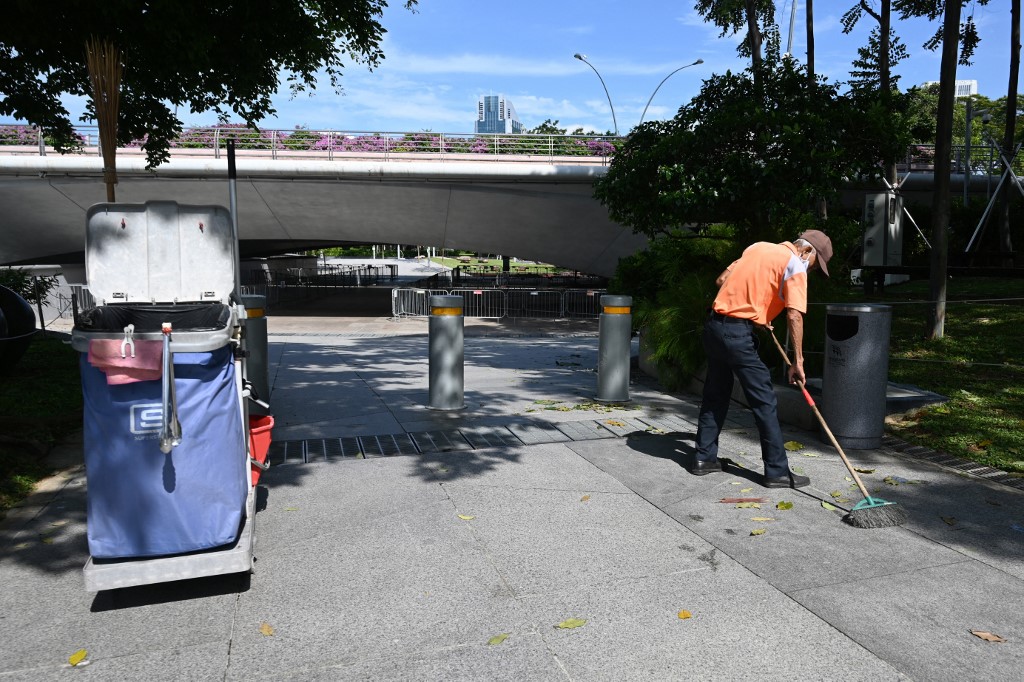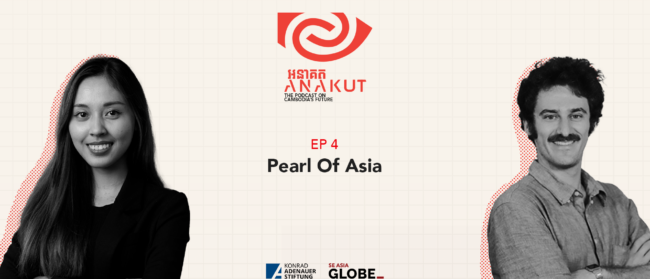An inconspicuous booth is tucked away in a quiet pathway in Singapore’s downtown with an array of books and other pieces of work.
Displayed in the middle of the table is a stand describing the dire circumstances of an anonymous migrant worker, one of those being assisted by a volunteer organisation called Migrant Mutual Aid. As the booth’s two minders explain to interested passersby, their group provides financial help or assistance to Singapore’s migrant workers in cases such as workplace accidents or unfair treatment by employers.
Rather than having a fixed price, every book is labelled with a range of prices, based on what an individual is able to pay. The book sales and the group itself work on a principle of mutual aid, a community-based approach to social issues that might include neighbourhood food pantries and volunteers to assist those in need.
Odette Yiu, a former member of Wares Mutual Aid, said interest for this people-centred approach grew throughout the hardships of the Covid-19 pandemic.
“Humans are not fundamentally, solely self-interested,” Yiu told the Globe. “You see many instances of people coming together to support one another, especially, but not exclusively, during times of crisis.”
This laissez-faire approach to social welfare isn’t what some might expect for Singapore, the tiny city-state with the wealthiest population in Southeast Asia. But in the gaps between quick corporate solutions and state-sponsored assistance, a subculture is growing for mutual aid. Some proponents see it as a political act that shrugs off the capitalist worldview. For others, especially in an unsteady era of pandemic and economic recession, mutual aid can mean food on the table and a compassionate hand.
Advocates like Yiu say it’s more of a ground-up social initiative that strives to do more than basic charity. For those championing this brand of colllectivism, it is about solidarity, plugging the gaps in the welfare system and bridging the divide between people in an increasingly atomised Singapore.
“It’s people helping each other and showing up for one another. It’s about tackling bureaucracy and structures that make survival and dignity so difficult. It’s a neighbourly and community spirit in a manner that regards one another as equals, as part of a collective. Crucially, it strives to be non-hierarchical,” Yiu explained.
Yiu first started out in this vein through Wares Mutual Aid, a community-run public spreadsheet started at the beginning of the pandemic in March 2020 that aimed to reach out to vulnerable groups across Singapore. Though the administrators of the spreadsheet have put the project on hold for now, the spreadsheet previously collated needs and offers for aid, coupled with contact numbers of people in tough conditions.

In Singapore, mutual aid is hardly the only provider in town for various kinds of assistance.
The Singaporean government directs a substantial network of programmes such as ComCare and the Workfare Income Supplement Scheme (WIS) to support people who can’t always provide for themselves. ComCare hands out monthly payouts over a certain period of time to people who need them on a case-by-case basis, while WIS supplements low wage workers’ incomes via cash payments and retirement contributions. Underpinning all of this is the city-state’s public housing system, which has been one of the national government’s central platforms since the establishment in 1960 of the prominent Housing Development Board.
But for most recipients, this system of provision comes with firm expectations attached.
Much of Singapore’s welfare system is built upon compulsory savings among individuals and firms, minimising the burden on the State. While it’s a different model than might be found in countries like Germany, in which the state funds services through tax revenue, it has anchored Singapore’s economic growth in a high state of human development.
“All welfare systems have pluses and minuses,” said John Donaldson, an associate professor from Singapore Management University. “Singapore goes by productivist welfare capitalism, where the idea is to get people back to work as fast as they can to avoid welfare dependence.”
In that, there remain instances where people are unable to access social assistance. Donaldson said that individuals who are physically unable to work may fall through the cracks, as might those who can’t rely on financial support from family members. Others in single-parent households that don’t fulfil the nuclear family unit might struggle to find proper housing. These sort of cases are where mutual aid can play a supportive role.
On a systemic level, Yiu also believes schemes such as ComCare can be invasive with their required documentation. They say the application process can be undignified, especially when institutionalised assistance is often portrayed as a last resort in a state that emphasises self-sufficiency.
“It’s this very disempowering and humiliating reliance on the state when people have to go through so many hurdles, just to prove their worthiness to get money to provide for their basic needs,” Yiu said. “There’s a lot of policing and criteria to meet and it keeps people apart. Instead of helping them thrive, these measures give them barely enough to survive.”
Donaldson raised some similar issues. “If the goal is to help people who need help, there are a lot of people who are falling through the cracks.”
From moral to financial support, they are the family I never had. It’s like playing Lego, piece by piece, building a house out of the thing, everything pieced together. They made me the normal person I should be
Alan is a 51-year-old recipient of financial help from mutual aid groups. Speaking to the Globe under a pseudonym, he shared that he had previously been staying at a shelter after failing to meet the ComCare criteria for assistance.
He said he’s also received emotional support to improve his mental health after a long abusive relationship. For that, he meets up regularly with Yiu and their team for meals. In his view, they have helped to rebuild his life.
“From moral to financial support, they are the family I never had,” Alan shared. “It’s like playing Lego, piece by piece, building a house out of the thing, everything pieced together. They made me the normal person I should be.”
Similar to Alan’s experiences, Yiu emphasises the importance of building relationships within a more organic social network.
“It isn’t just about money and plugging these gaps, but getting people to feel empowered and connected with one another, not isolated,” Yiu explained. “It’s building a network.”
However, it is not all smooth sailing. Both Alan and Yiu say since trust is the currency of mutual aid, abuses do happen.
“When trust gets broken, people need to be accountable, but often times the other person might be unwilling to be accountable,” Yiu admitted, acknowledging that this abuse of trust can make people skeptical of mutual aid.
Yiu also said the coordination required between different parties can also be exhausting. After just a few months, the administrators of the Wares spreadsheet were so stretched that they had to take a break from the constant fundraising and distribution needed to meet requests.
But though the spreadsheet specifically has been phased out, Yiu says the early network connected through it has endured through people continuing their efforts in the community. Still, in a state that has worked to depoliticise charity work while ingraining that aid must come through a top-down approach, Yiu believes mutual aid could reimagine the Singaporean mindset.
“Mutual aid is a way of life,” Yiu said. “It is about rethinking relationships and hierarchies – the way I regard and communicate with other people. Am I speaking to them from a place of internalised pity, assuming that they are less than whatever I am? Or am I recognising that we are both humans with equal human potential and worthiness?”
When asked what their hope for Singapore is, Yiu put forth an ideal emphasising solidarity.
“I’d love to see people collectively move forward. I feel like I would love to see a culture where people realise the neighbour next to them is struggling as well and that it’s a collective issue, not a ‘me’ issue.”
For those who wish to contribute to mutual aid efforts, they can visit Migrant Mutual Aid on Instagram, while a list of articles is available here for anyone interested in reading more about mutual aid.


